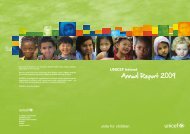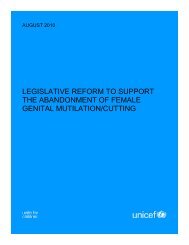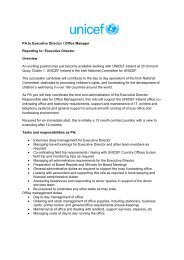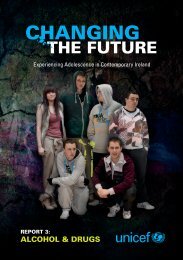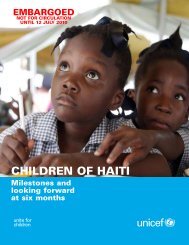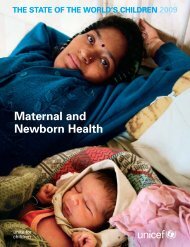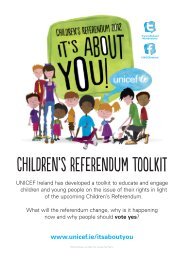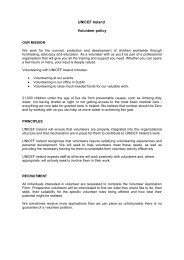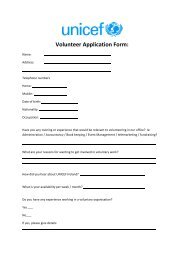Change the Future - UNICEF Ireland
Change the Future - UNICEF Ireland
Change the Future - UNICEF Ireland
You also want an ePaper? Increase the reach of your titles
YUMPU automatically turns print PDFs into web optimized ePapers that Google loves.
CHANGING<br />
THE FUTURE<br />
Experiencing Adolescence in Contemporary <strong>Ireland</strong><br />
REPORT 2:<br />
MENTAL HEALTH<br />
<strong>UNICEF</strong> Changing <strong>the</strong> <strong>Future</strong><br />
1.
<strong>Change</strong> <strong>the</strong> future<br />
<strong>UNICEF</strong> is a global organisation, working in more than 190 countries to help build a world in which children’s rights are<br />
respected, <strong>the</strong>ir needs are provided for, and <strong>the</strong>y have a voice in shaping <strong>the</strong> world around <strong>the</strong>m. We believe in changing <strong>the</strong><br />
world for children in <strong>Ireland</strong> too. <strong>UNICEF</strong> advocates for all young people to ensure that <strong>the</strong>y have every opportunity to grow,<br />
develop and contribute to our society. We are working to ensure that young people in <strong>Ireland</strong> are heard and that <strong>the</strong>ir rights<br />
are realised.<br />
This is why we believe <strong>the</strong> <strong>Change</strong> <strong>the</strong> <strong>Future</strong>: Experiencing Youth in Contemporary <strong>Ireland</strong> Report Series is vitally important –<br />
because it is founded exclusively on <strong>the</strong> views of young people. <strong>Change</strong> <strong>the</strong> <strong>Future</strong> is about <strong>the</strong> voice of young people living<br />
in <strong>Ireland</strong>, telling us <strong>the</strong>ir story, in <strong>the</strong>ir words.<br />
This Research Project was coordinated by <strong>UNICEF</strong> <strong>Ireland</strong>.<br />
The research, data and findings reported in <strong>Change</strong> <strong>the</strong> <strong>Future</strong>: Experiencing Youth in Contemporary <strong>Ireland</strong>: Mental Health<br />
was completed and compiled in December 2010. <strong>UNICEF</strong> would like to express our gratitude to our research partners MCCP,<br />
and The Base Ballyfermot. Fur<strong>the</strong>r details of <strong>the</strong> methodology and background to <strong>the</strong> Report are available through <strong>the</strong><br />
offices of <strong>UNICEF</strong> <strong>Ireland</strong>: www.unicef.ie<br />
Any part of <strong>the</strong> Report may be freely reproduced using <strong>the</strong> following citation or reference: <strong>UNICEF</strong> <strong>Ireland</strong>, <strong>Change</strong> <strong>the</strong><br />
<strong>Future</strong>: Experiencing Adolescence in Contemporary <strong>Ireland</strong>: Mental Health January 2011. The views expressed in this Report<br />
represent those of <strong>the</strong> authors and do not necessarily reflect <strong>the</strong> policies or views of <strong>UNICEF</strong>.<br />
Photography: The photographs of young people used within this report for illustration are images posed by models and do<br />
not depict actual situations, or reflect <strong>the</strong> <strong>the</strong>mes of <strong>the</strong> Report.<br />
<strong>UNICEF</strong> <strong>Ireland</strong>,<br />
33 Lower Ormond Quay, Dublin 1,<br />
Republic of <strong>Ireland</strong>.<br />
Tel: (+353) 01 878 3000<br />
Fax: (+353) 01 878 6655<br />
Web: www.unicef.ie<br />
Email: info@unicef.ie<br />
As <strong>the</strong> Changing <strong>the</strong> <strong>Future</strong> Report Series continues, this<br />
second report focuses on adolescent experiences of<br />
mental health, and <strong>the</strong> associated issues and pressures to<br />
which young people are being exposed.<br />
There are many disturbing and heart breaking findings<br />
in this report. The pain that many young people are<br />
experiencing was very evident not only in <strong>the</strong> statistics<br />
but also in <strong>the</strong> comments made by <strong>the</strong> many brave, young<br />
people who took part in this survey. Our findings show<br />
that many young people experience serious mental health<br />
issues at some stage. Yet very few of <strong>the</strong>m receive any<br />
professional help and as a result many experience ongoing<br />
problems.<br />
Young people have <strong>the</strong> capacity to help us reach <strong>the</strong><br />
solutions to <strong>the</strong>se challenges. Through <strong>the</strong>ir compassion,<br />
determination and kindness young people all across<br />
<strong>Ireland</strong> continue to reach out to peers experiencing<br />
difficulty every day. The young people who chose to take<br />
part in this Research continue this tradition, by sharing<br />
<strong>the</strong>ir stories with <strong>UNICEF</strong>, <strong>the</strong>y are ensuring that we can<br />
act to support young people who we know may come to<br />
experience those same challenges in <strong>the</strong> future.<br />
It is crucial that all of us in <strong>Ireland</strong> break down <strong>the</strong><br />
stigmas and taboos that surround adolescent mental<br />
health. Confronting <strong>the</strong>se issues is <strong>the</strong> first step towards<br />
promoting and ensuring positive mental health for<br />
all young people, and supporting and assisting those<br />
young people who experience difficulties, to return to<br />
equilibrium as quickly and conclusively as possible.<br />
As a society we must all ask serious questions about our<br />
ability to reach out to young people who are experiencing<br />
<strong>the</strong>se difficulties. We must question <strong>the</strong> quality of our<br />
efforts to offer support to young people in crisis.<br />
We must strive to ensure that every single young person<br />
who needs our companionship, our understanding and<br />
our assistance knows that we are here for <strong>the</strong>m, and<br />
knows <strong>the</strong> avenues through which <strong>the</strong>y can draw down<br />
that support, in a safe, protective, confidential and nonjudgemental<br />
way.<br />
The right to good health, both physical and mental is not<br />
something that young people in <strong>Ireland</strong> should have to<br />
aspire to. It is something to which <strong>the</strong>y are entitled, and<br />
which we are beholden to secure on <strong>the</strong>ir behalf.<br />
We must do more to ensure that when it comes to positive<br />
mental health, our children know that <strong>the</strong>y have nothing to<br />
hide, that <strong>the</strong>re are sympa<strong>the</strong>tic and supportive avenues<br />
to which <strong>the</strong>y can turn, that <strong>the</strong>y no child has to face <strong>the</strong>se<br />
challenges alone.<br />
Melanie Verwoerd<br />
Executive Director, <strong>UNICEF</strong> <strong>Ireland</strong>.<br />
Changing <strong>the</strong> <strong>Future</strong>: Experiencing Adolescence in Contemporary <strong>Ireland</strong>: Mental Health. <strong>UNICEF</strong> Changing <strong>the</strong> <strong>Future</strong> 3.
<strong>Change</strong> <strong>the</strong> future<br />
Why now?<br />
In 2006, <strong>the</strong> Irish Government published its “Vision for<br />
<strong>Change</strong>”, a Report of <strong>the</strong> expert group on Mental Health<br />
Policy that had been convened to review Irish policy<br />
and practice in Mental Health. The report sought to<br />
“formulate a blueprint for a modern, comprehensive,<br />
world-class service to meet <strong>the</strong> mental health challenges<br />
facing our society.”<br />
A Vision for <strong>Change</strong> addressed some of <strong>the</strong> most<br />
fundamental challenges that face <strong>the</strong> implementation of<br />
that system – challenges of understanding, of taboo, of<br />
structure, of service delivery and challenges of access.<br />
A Vision for <strong>Change</strong> also directly addressed <strong>the</strong> very<br />
specific issues that children and young people face<br />
with regards to mental health, recognising that <strong>the</strong>se<br />
issues have <strong>the</strong>ir own unique character. If <strong>Ireland</strong> is<br />
to successfully implement a system that promotes and<br />
defends young peoples right to <strong>the</strong> enjoyment of positive<br />
mental health, <strong>the</strong>n that system must respond to <strong>the</strong><br />
perspectives and needs identified by young people<br />
<strong>the</strong>mselves.<br />
The child’s right to mental health is enshrined within <strong>the</strong><br />
United Nations Convention on <strong>the</strong> Rights of <strong>the</strong> Child,<br />
Article 24 of which states that:<br />
“The State shall recognise <strong>the</strong> rights of a child<br />
to <strong>the</strong> enjoyment of <strong>the</strong> highest attainable<br />
standard of health and <strong>the</strong> facilities for <strong>the</strong><br />
treatment and rehabilitation of health, shall<br />
strive to ensure that no child is deprived of his<br />
or her access to such health care services.”<br />
The obligation on <strong>the</strong> State to adequately equip children<br />
and young people to meet <strong>the</strong> challenges <strong>the</strong>y face in<br />
terms of maintaining positive mental health was fur<strong>the</strong>r<br />
recognised within “Our Children – Their Lives” <strong>the</strong><br />
National Children’s Strategy 2000-2010, which states:<br />
“Children will be supported to enjoy<br />
<strong>the</strong> optimum physical, mental and<br />
emotional well-being.”<br />
It is widely recognised in <strong>Ireland</strong>, and internationally, that<br />
<strong>the</strong>re are certain obligations to children and young people<br />
to which <strong>the</strong> State is beholden. Amongst <strong>the</strong>se obligations<br />
stands provision for positive mental health, and <strong>the</strong><br />
necessary supports and services to equip young people to<br />
address mental ill-health when and where it occurs.<br />
Every child has mental health needs. A child does not<br />
need to have experienced specific trauma, illness, have<br />
been socially excluded or physically bullied to have <strong>the</strong>se<br />
mental health needs. The system outlined in A Vision for<br />
<strong>Change</strong> should not be conceived to identify and reach<br />
out only to those children and young people in <strong>Ireland</strong><br />
who have been identified as experiencing specific mental<br />
health problems, but to all children living in <strong>the</strong> State.<br />
There is no better way to begin this important<br />
conversation than to ask young people <strong>the</strong>mselves.<br />
It is crucial, if we are to successfully address <strong>the</strong> issues<br />
that surround mental health, that young people <strong>the</strong>mselves<br />
assume a central role in that dialogue, collective<br />
understanding, and effort. If we are to successfully<br />
engage <strong>the</strong> issues that affect adolescent mental health,<br />
promote <strong>the</strong> most positive experience of mental health<br />
amongst young people, and respond appropriately and<br />
successfully to <strong>the</strong>ir experience of mental ill-health, <strong>the</strong>n<br />
young people <strong>the</strong>mselves must assume a central role in<br />
<strong>the</strong> way in which we approach that effort.<br />
Young people are already, and ever more increasingly<br />
have to become, part of <strong>the</strong> solution. We have to open<br />
<strong>the</strong> conversation up – to listen, to address stigmas, to be<br />
inclusive, to learn and to gain from <strong>the</strong>ir unique insights.<br />
We have to place young people at <strong>the</strong> centre.<br />
How did we do it?<br />
<strong>Change</strong> <strong>the</strong> <strong>Future</strong>: Experiencing Adolescence in<br />
Contemporary <strong>Ireland</strong>: Mental Health is <strong>the</strong> second in a<br />
series of four reports that will be published by <strong>UNICEF</strong><br />
<strong>Ireland</strong> in 2011. The purpose of this series is to present<br />
<strong>the</strong> results of primary research that we carried out at<br />
<strong>the</strong> end of 2010, and to combine <strong>the</strong> findings of those<br />
four reports into a single holistic snapshot of adolescent<br />
wellbeing in <strong>Ireland</strong>.<br />
The first of <strong>the</strong>se four Reports - <strong>Change</strong> <strong>the</strong> <strong>Future</strong>:<br />
Experiencing Adolescence in Contemporary <strong>Ireland</strong>:<br />
Happiness, Bullying and <strong>the</strong> Recession, published in April<br />
2011, has already outlined <strong>the</strong> methodology employed<br />
in this research in some detail. For that reason, <strong>Change</strong><br />
<strong>the</strong> <strong>Future</strong>: Experiencing Adolescence in Contemporary<br />
<strong>Ireland</strong>: Mental Health will only restate <strong>the</strong> broadest<br />
elements of that methodology:<br />
➦➦The research includes respondents from all<br />
four Provinces – Leinster, Munster, Ulster and<br />
Connaught;<br />
➦➦The results include male and female respondents;<br />
➦➦The research featured <strong>the</strong> responses of young<br />
people aged 16 to 20 years;<br />
➦➦The survey used youth-friendly language;<br />
➦➦All information ga<strong>the</strong>red on <strong>the</strong> pages of <strong>the</strong> survey<br />
website remains confidential;<br />
➦➦No information ga<strong>the</strong>red will be shared with any<br />
o<strong>the</strong>r party;<br />
➦➦No IP addresses or o<strong>the</strong>r technical information<br />
was captured by our software or within <strong>the</strong><br />
research;<br />
➦➦No contact information that could identify any<br />
respondent for this survey - including emails,<br />
phone numbers, pictures, videos, sound files or<br />
names and addresses or o<strong>the</strong>r information was<br />
ga<strong>the</strong>red by this research;<br />
➦➦The only demographic information ga<strong>the</strong>red<br />
was: age, sex and county of residence. This is<br />
not considered sufficient to identify <strong>the</strong> location<br />
or identity of any respondent and ensures that<br />
respondents can give full and frank replies to<br />
questions without any worry of being identified at a<br />
later date by any individual, group or body;<br />
➦➦Questions were both prompted and unprompted,<br />
allowing for both qualitative and quantitative<br />
results to emerge from <strong>the</strong> data collected;<br />
➦➦The survey asked <strong>the</strong> participants to tell us<br />
“in <strong>the</strong>ir own words” as often as possible;<br />
➦➦Throughout this Report, we have presented those<br />
responses exactly as <strong>the</strong>y were told to us by <strong>the</strong><br />
young people <strong>the</strong>mselves.<br />
Fur<strong>the</strong>r details of <strong>the</strong> conceptual framework and<br />
methodology employed in this research project can be<br />
gained from <strong>the</strong> series’ first report <strong>Change</strong> <strong>the</strong> <strong>Future</strong>:<br />
Experiencing Adolescence in Contemporary <strong>Ireland</strong>:<br />
Happiness, Bullying and <strong>the</strong> Recession, or by contacting<br />
<strong>the</strong> offices of <strong>UNICEF</strong> <strong>Ireland</strong>.<br />
<strong>UNICEF</strong> <strong>Ireland</strong> will go on to publish <strong>the</strong> third report in <strong>the</strong><br />
Series – <strong>Change</strong> <strong>the</strong> <strong>Future</strong>: Experiencing Adolescence in<br />
Contemporary <strong>Ireland</strong>: Drugs and Alcohol, later in 2011.<br />
Changing <strong>the</strong> <strong>Future</strong>: Experiencing Adolescence in Contemporary <strong>Ireland</strong>: Mental Health. <strong>UNICEF</strong> Changing <strong>the</strong> <strong>Future</strong> 5.
Mental Health<br />
What did we f ind?<br />
The report covers a range of very serious issues that<br />
clearly affect a large proportion of young people living in<br />
<strong>Ireland</strong>.<br />
<strong>UNICEF</strong> <strong>Ireland</strong> believes that it is in <strong>the</strong> interest of all<br />
Irish people, young and old, to be forthright in <strong>the</strong>ir<br />
understanding and discussion of issues such as suicide,<br />
depression, self-harm and eating disorders, and <strong>the</strong><br />
prevalence of <strong>the</strong>se problems amongst young people<br />
living in <strong>Ireland</strong>. We must engage <strong>the</strong> issues with<br />
sensitivity, but also determination.<br />
Mental Health Issues: How prevalent<br />
are <strong>the</strong>y among young Irish people?<br />
There are certain issues that continue to emerge in<br />
discussions centred on adolescent mental health,<br />
and <strong>UNICEF</strong> <strong>Ireland</strong> wanted to give young people <strong>the</strong><br />
opportunity to report <strong>the</strong>ir own experiences of those<br />
issues. Of course, <strong>the</strong> medical diagnosis of a condition<br />
such as depression could be different to <strong>the</strong> selfreporting<br />
of that same condition, however <strong>UNICEF</strong><br />
wanted to give young people <strong>the</strong> opportunity to tell us of<br />
<strong>the</strong>ir experiences in <strong>the</strong> manner <strong>the</strong>y saw fit.<br />
The research findings also point to two very worrying<br />
trends, those of feeling suicidal and self harming.<br />
Which would you say you have felt or<br />
suffered from in <strong>the</strong> past?<br />
26%<br />
20%<br />
Fur<strong>the</strong>rmore, 13% of young Irish people report that <strong>the</strong>y<br />
have suffered from Anorexia or Bulimia in <strong>the</strong> past.<br />
Which would you say you have felt or<br />
suffered from in <strong>the</strong> past?<br />
It is only by discussing <strong>the</strong>se issues openly and without<br />
prejudice that we can begin to address <strong>the</strong> stigmas and<br />
taboos that continue to surround mental health in this<br />
country.<br />
Which would you say you have felt or<br />
suffered from in <strong>the</strong> past?<br />
0 10 20 30 40 50<br />
13%<br />
0 10 20 30 40 50<br />
Only once we have engaged with <strong>the</strong>se issues directly,<br />
discussed <strong>the</strong>m openly, and confronted <strong>the</strong>m in a public<br />
and unified manner, can we truly hope to assist <strong>the</strong><br />
great many young people who have reported <strong>the</strong>ir own<br />
admirable efforts to address <strong>the</strong>se great challenges.<br />
50% Depression<br />
29% O<strong>the</strong>r<br />
26% Feeling Suicidal<br />
20% Self Harming<br />
14% None<br />
13% Anorexia / Bulimia<br />
50% Depression<br />
29% O<strong>the</strong>r<br />
26% Feeling Suicidal<br />
20% Self Harming<br />
14% None<br />
13% Anorexia / Bulimia<br />
In establishing this understanding we can offer not<br />
just empathy, but our assistance in an informed and<br />
comprehensive way.<br />
0 10 20 30 40 50<br />
50% Depression<br />
29% O<strong>the</strong>r<br />
26% Feeling Suicidal<br />
20% Self Harming<br />
14% None<br />
13% Anorexia / Bulimia<br />
More than One Quarter of young Irish people<br />
report that <strong>the</strong>y have felt or suffered from<br />
feeling suicidal in <strong>the</strong> past.<br />
13% of young Irish people report that <strong>the</strong>y<br />
have felt or suffered from Anorexia / Bulimia<br />
in <strong>the</strong> past.<br />
“Depression for me now is a problem and is<br />
having a physical impact on me”<br />
“Physically sick, terrified... Suicidal.”<br />
1 in 5 young Irish people report that <strong>the</strong>y have<br />
felt or suffered from self harming in <strong>the</strong> past.<br />
Overall, in terms of young peoples’ reports of <strong>the</strong>ir own<br />
experiences of <strong>the</strong> issues raised by <strong>the</strong> research, a clear<br />
picture has emerged: 1 in 2 young Irish people report that<br />
<strong>the</strong>y have suffered from depression in <strong>the</strong> past, a fur<strong>the</strong>r<br />
1 in 4 report that <strong>the</strong>y have felt suicidal, 1 in 5 report that<br />
<strong>the</strong>y have self harmed, and more than 1 in 10 report that<br />
<strong>the</strong>y have suffered from Anorexia or Bulimia.<br />
50% of young Irish people report that <strong>the</strong>y have<br />
felt or suffered from depression in <strong>the</strong> past.<br />
Changing <strong>the</strong> <strong>Future</strong>: Experiencing Adolescence in Contemporary <strong>Ireland</strong>: Mental Health. <strong>UNICEF</strong> Changing <strong>the</strong> <strong>Future</strong> 7.
GenDer<br />
The Signif icance of Gender<br />
in Mental Health<br />
The findings point to some clear distinctions in terms of<br />
gender. It is evident that <strong>the</strong> extent to which girls and<br />
boys experience <strong>the</strong>se concerns is markedly different,<br />
and it is essential that we acknowledge <strong>the</strong>se disparities<br />
if we are to discuss policies that can successfully<br />
address <strong>the</strong>m.<br />
Which would you say you have felt or<br />
suffered from in <strong>the</strong> past?<br />
It is apparent that a greater proportion of girls, report<br />
depression, self harm, anorexia/bulimia, and feeling<br />
suicidal. There is a clear and noticeable gender disparity<br />
which is reflected in <strong>the</strong> reporting of <strong>the</strong>se four issues.<br />
Considering each of <strong>the</strong>se issues in turn, <strong>the</strong> gender<br />
disparity becomes evident.<br />
The difference in <strong>the</strong> experience of depression between<br />
<strong>the</strong> two genders is illustrated below.<br />
The difference in <strong>the</strong> experience of<br />
depression between <strong>the</strong> two genders<br />
49%<br />
59%<br />
Significantly more girls than boys report<br />
self harming<br />
0 10 20 30 40 50 60<br />
Boys<br />
Girls<br />
16% 27%<br />
16%<br />
27%<br />
Self Harming<br />
11% more girls report to have suffered<br />
from self harming than boys.<br />
Significantly more girls report suffering<br />
from Anorexia or Bulimia<br />
0 10 20 30 40 50 60<br />
Boys<br />
2%<br />
Girls<br />
2% 23%<br />
23%<br />
Anorexia / Bulimia<br />
23% of girls report that <strong>the</strong>y have<br />
experienced Anorexia or Bulimia<br />
compared to just 2% of boys.<br />
0 10 20 30 40 50 60<br />
Boys<br />
Girls<br />
49% 59% Depression<br />
More girls report feeling suicidal than boys<br />
24%<br />
32%<br />
0 10 20 30 40 50 60<br />
It is <strong>the</strong> case, <strong>the</strong>refore, that more girls than boys have<br />
reported <strong>the</strong> experience of depression, feeling suicidal,<br />
self harming and anorexia/bulimia. This disparity may<br />
represent different prevalence rates between <strong>the</strong> boys<br />
and girls, or it may represent different reporting rates<br />
amongst <strong>the</strong> two genders.<br />
0 10 20 30 40 50 60<br />
Boys<br />
Girls<br />
49% 59% Depression<br />
16% 27% Self Harming<br />
2% 23% Anorexia / Bulimia<br />
“Did not fit in good enough with friends or<br />
to be with o<strong>the</strong>r people too.”<br />
10% more girls report to have suffered<br />
from depression than boys.<br />
Boys<br />
Girls<br />
24% 32%<br />
Feeling Suicidal<br />
8% more girls report to have suffered<br />
from self harming than boys.<br />
In ei<strong>the</strong>r case it is evidently important that policy<br />
responses to <strong>the</strong>se issues must be gender sensitive and<br />
responsive to <strong>the</strong>se different needs.<br />
24% 32%<br />
Feeling Suicidal<br />
42% 28% O<strong>the</strong>r<br />
A greater proportion of girls report suffering<br />
from Depression, Self harm, Anorexia / Bulimia<br />
and feeling suicidal than boys.<br />
Changing <strong>the</strong> <strong>Future</strong>: Experiencing Adolescence in Contemporary <strong>Ireland</strong>: Mental Health. <strong>UNICEF</strong> Changing <strong>the</strong> <strong>Future</strong> 9.
Reporting<br />
Different mental health issues can<br />
occur toge<strong>the</strong>r for individual young<br />
people<br />
Ano<strong>the</strong>r significant pattern emerges in relation to <strong>the</strong><br />
way in which some young people reported <strong>the</strong> concurrent<br />
experience of some of <strong>the</strong>se mental health concerns.<br />
The findings in this section <strong>the</strong>refore highlight <strong>the</strong><br />
multiple ways <strong>the</strong>se different mental health problems can<br />
overlap for individual young people.<br />
Young people who have experienced<br />
Depression<br />
The research findings reveal that a greater proportion<br />
of young people who have reported <strong>the</strong> experience of<br />
depression, also report experiencing o<strong>the</strong>r mental health<br />
issues.<br />
Which would you say you have felt or<br />
suffered from in <strong>the</strong> past?<br />
Of <strong>the</strong> 50% who reported to have felt or<br />
suffered from depression – 35% have also self<br />
harmed, 19% have also suffered from Anorexia<br />
or Bulimia and 46% have also felt suicidal.<br />
Young people who have experienced<br />
Self Harm<br />
Similarly, <strong>the</strong> young people who reported self-harming<br />
also reported a higher prevalence of depression,<br />
Anorexia / Bulimia and/or feeling suicidal.<br />
Which would you say you have felt or<br />
suffered from in <strong>the</strong> past?<br />
It is <strong>the</strong>refore <strong>the</strong> case, that of <strong>the</strong> 20% of young people<br />
who report <strong>the</strong> experience of self harm, <strong>the</strong> great majority<br />
also report that <strong>the</strong>y have experienced depression and/<br />
or have felt suicidal. This suggests <strong>the</strong> possible overlap<br />
of three extremely traumatic and potentially dangerous<br />
experiences amongst 1 in 5 young Irish people.<br />
The great majority of young Irish people<br />
who report to have experienced self harm<br />
also report <strong>the</strong> experiences of depression,<br />
and feeling suicidal.<br />
Young People who have experienced<br />
Anorexia / Bulimia<br />
A large proportion of <strong>the</strong> young people who report that<br />
<strong>the</strong>y have experienced anorexia/bulimia also report that<br />
<strong>the</strong>y have experienced o<strong>the</strong>r mental health issues.<br />
Which would you say you have felt or<br />
suffered from in <strong>the</strong> past?<br />
Of <strong>the</strong> 13% who report to have suffered from<br />
Anorexia or Bulimia, 72% have also felt<br />
depressed, 46% have also self harmed and<br />
60% have also felt suicidal.<br />
Young People who have felt<br />
Suicidal<br />
Finally, <strong>the</strong> research findings reveal that young people<br />
who report that <strong>the</strong>y felt suicidal also report that <strong>the</strong>y<br />
have experienced <strong>the</strong> o<strong>the</strong>r mental health concerns<br />
raised by <strong>the</strong> research.<br />
Which would you say you have felt or<br />
suffered from in <strong>the</strong> past?<br />
50% 89% Depression<br />
20% 56% Self Harming<br />
13% 31% Anorexia / Bulimia<br />
0 20 40 60 80 100<br />
% %<br />
Total Base<br />
50% 84% Depression<br />
0 10 20 30 40 50<br />
% %<br />
Total Base<br />
20% 35% Self Harming<br />
13% 19% Anorexia / Bulimia<br />
26% 46% Feeling Suicidal<br />
Base = 50% that felt depressed.<br />
13% 30% Anorexia / Bulimia<br />
26% 71% Feeling Suicidal<br />
Base = 20% that felt self harmed.<br />
Of <strong>the</strong> 20% who reported to have self harmed,<br />
84% have also felt depressed, 30% have also<br />
experienced Anorexia / Bulimia and<br />
71% have also felt suicidal.<br />
0 10 20 30 40 50 60 70 80<br />
% %<br />
Total Base<br />
50% 72% Depression<br />
20% 46% Self Harming<br />
26% 60% Feeling Suicidal<br />
Base = 13% that suffered Anorexia / Bulimia.<br />
0 20 40 60 80 100<br />
% %<br />
Total Base<br />
Base = 26% who have felt suicidal.<br />
Changing <strong>the</strong> <strong>Future</strong>: Experiencing Adolescence in Contemporary <strong>Ireland</strong>: Mental Health. <strong>UNICEF</strong> Changing <strong>the</strong> <strong>Future</strong> 11.
lInk To Bullying<br />
Of <strong>the</strong> 26% who reported to have felt<br />
suicidal, 89% have also felt depressed,<br />
56% have also self harmed and 31% have<br />
also experienced Anorexia / Bulimia.<br />
In all four findings, <strong>the</strong> research presents clear overlaps<br />
of <strong>the</strong> issues amongst <strong>the</strong> same individuals. In general<br />
terms, it seems clear that <strong>the</strong> experience of one of <strong>the</strong>se<br />
mental health related experiences is often associated<br />
with <strong>the</strong> experience of o<strong>the</strong>rs.<br />
A young persons’ experience of one of<br />
<strong>the</strong> Mental Health concerns raised in <strong>the</strong><br />
research is often associated with <strong>the</strong>ir<br />
experience of o<strong>the</strong>rs.<br />
The link to Bullying<br />
<strong>UNICEF</strong> also looked at <strong>the</strong> relationship between<br />
bullying, and <strong>the</strong> reporting of <strong>the</strong> four mental health<br />
concerns raised by <strong>the</strong> research. In <strong>Change</strong> <strong>the</strong> <strong>Future</strong>:<br />
Experiencing Adolescence in Contemporary <strong>Ireland</strong>:<br />
Happiness, Bullying and <strong>the</strong> Recession, <strong>UNICEF</strong> found that<br />
55% of young people reported that <strong>the</strong>y had been bullied.<br />
If we are to take this proportion as <strong>the</strong> base and overlap<br />
<strong>the</strong> reporting of depression, feeling suicidal or self-harm,<br />
a clear link becomes evident.<br />
Which would you say you have felt or<br />
suffered from in <strong>the</strong> past?<br />
It is <strong>the</strong>refore <strong>the</strong> case that <strong>the</strong> great majority of young<br />
people who reported that <strong>the</strong>y have been bullied, also<br />
report <strong>the</strong> experience of o<strong>the</strong>r issues such depression,<br />
self-harm, anorexia / bulimia or feeling suicidal.<br />
While it is not clear that bullying is a causative factor<br />
in <strong>the</strong>se experiences, <strong>the</strong> prevalence of <strong>the</strong> overlap<br />
between <strong>the</strong>se issues beg very important questions about<br />
<strong>the</strong> links between <strong>the</strong>m.<br />
Are <strong>the</strong> Problems ongoing?<br />
The report has concentrated on <strong>the</strong> reporting by<br />
young people of <strong>the</strong> experience of challenges such as<br />
depression, self harm and feeling suicidal. The research<br />
findings suggest that <strong>the</strong> experience of such issues is<br />
prevalent. However, this is only part of <strong>the</strong> picture.<br />
While it is important to understand <strong>the</strong> prevalence of<br />
<strong>the</strong>se experiences, we must also be cognisant of <strong>the</strong> fact<br />
that, for a great many of <strong>the</strong> young people who took part in<br />
this research, <strong>the</strong> problems are ongoing.<br />
In terms of <strong>the</strong> gender distinction, once more it is<br />
apparent that greater proportions of girls than boys report<br />
that <strong>the</strong>y continue to experience <strong>the</strong> problem.<br />
1<br />
“I’m afraid to admit…<br />
because I fear that people<br />
will judge me harshly<br />
because of it.”<br />
27%<br />
73%<br />
Similarly, <strong>the</strong>re is a clear distinction in terms of <strong>the</strong><br />
ages of <strong>the</strong> young people who report that <strong>the</strong> problem<br />
pervades, with a steady rise in reporting of <strong>the</strong> on-going<br />
experience until <strong>the</strong> age of 19, <strong>the</strong>n a noticeable reduction<br />
at <strong>the</strong> age of 20.<br />
“I was young so I felt distraught…”<br />
59 60 61 62 63 64 65 66 67 68 %<br />
62% Depression<br />
67% Self Harming<br />
67% Feeling Suicidal<br />
Base = 55% that reported being bullied.<br />
While <strong>UNICEF</strong> had asked if <strong>the</strong> young people had<br />
experienced <strong>the</strong> concerns in <strong>the</strong> past, we were told that<br />
41% were still experiencing <strong>the</strong> issues at <strong>the</strong> time of <strong>the</strong><br />
research.<br />
Are you still having this problem?<br />
2<br />
The greatest proportion<br />
of young people who report<br />
that <strong>the</strong> problems are ongoing<br />
are 19 years old.<br />
Age %<br />
16 28<br />
17 49<br />
18 45<br />
19 51<br />
20 31<br />
Yes: 41%<br />
“I felt like I must have done something really<br />
bad to deserve it – like it was all my fault.”<br />
Close to two-thirds of <strong>the</strong> young people<br />
who reported that <strong>the</strong>y have been bullied,<br />
reported <strong>the</strong> experiences of depression,<br />
self harming or feeling suicidal.<br />
No: 59%<br />
0 10 20 30 40 50 60<br />
Two in five young people are still<br />
experiencing <strong>the</strong> issue.<br />
1 Explanatory Note:<br />
The Percentage reported for each gender represents <strong>the</strong><br />
proportion of <strong>the</strong> total sample who responded yes. ie 27% of<br />
those were responded “Yes” to this question were males.<br />
2 Explanatory Note:<br />
The Percentage reported for each age represents <strong>the</strong><br />
proportion of <strong>the</strong> total sample size. ie 45% of all 18 year old<br />
respondents reported that <strong>the</strong>y were still having this problem.<br />
Changing <strong>the</strong> <strong>Future</strong>: Experiencing Adolescence in Contemporary <strong>Ireland</strong>: Mental Health. <strong>UNICEF</strong> Changing <strong>the</strong> <strong>Future</strong> 13.
Getting Help<br />
Getting Help: Are young people<br />
getting <strong>the</strong> support <strong>the</strong>y need?<br />
Young people are revealing <strong>the</strong> widespread experience<br />
of distressing issues, which are difficult to address alone<br />
without <strong>the</strong> necessary systems and supports.<br />
Addressing challenges such as those discussed in this<br />
Report can be demanding, and even more so to do alone.<br />
Yet when we asked young people if <strong>the</strong>y were receiving<br />
any help to address <strong>the</strong>ir concerns, <strong>the</strong> overwhelming<br />
majority reported that <strong>the</strong>y were not.<br />
The fact that 82% of young people who were still<br />
experiencing <strong>the</strong> problem also reported that <strong>the</strong>y were<br />
not receiving any help, professional or o<strong>the</strong>rwise, is of<br />
significant concern.<br />
There are a number of very important avenues (such<br />
as peer or family support, <strong>the</strong> support of teachers and<br />
guidance counsellors in schools, and <strong>the</strong> professional<br />
assistance of care workers, doctors or mental health<br />
<strong>the</strong>rapists) towards which a young person in distress<br />
should be able to turn for assistance, understanding<br />
and support.<br />
Getting Help :<br />
Where do young people turn?<br />
The 18% who reported that <strong>the</strong>y were receiving help<br />
revealed a variety of different sources of that assistance.<br />
Who is helping you with this at present?<br />
O<strong>the</strong>r reported sources of help were family members,<br />
doctors, <strong>the</strong>rapists, teachers and care workers. While<br />
<strong>the</strong> availability of peer support can provide a vital lifeline<br />
to young people in distress, a major concern suggested<br />
by <strong>the</strong>se findings is that a comparatively small number of<br />
young people report that <strong>the</strong>y are seeking professional<br />
assistance. 4<br />
Who is helping you with this at present?<br />
63%<br />
Are you getting professional or o<strong>the</strong>r help?<br />
Yes: 18%<br />
No: 82%<br />
0 50 100<br />
“Isolated and unwanted.”<br />
Only 18% of <strong>the</strong> young people who<br />
reported that <strong>the</strong>y were still experiencing<br />
<strong>the</strong> problem reported that <strong>the</strong>y were<br />
getting help, of any kind.<br />
82% of <strong>the</strong> young people reported that <strong>the</strong>y<br />
were not receiving any help from any source.<br />
With such a low number of young people reporting that<br />
<strong>the</strong>y are receiving assistance an important question must<br />
be asked – Is it <strong>the</strong> case that <strong>the</strong>se avenues are not open<br />
to <strong>the</strong> vast majority of young people who need <strong>the</strong>m, or<br />
that <strong>the</strong> young people <strong>the</strong>mselves are choosing not to<br />
use <strong>the</strong>m?<br />
There is also a significantly lower proportion of younger<br />
people who report that <strong>the</strong>y are getting help, which grows<br />
as <strong>the</strong> respondents age increases. More than twice as<br />
many 19 year olds reported that <strong>the</strong>y were getting help<br />
compared to 17 year olds. It is clear that <strong>the</strong> younger <strong>the</strong><br />
person is, <strong>the</strong> less likely it is that <strong>the</strong>y are in receipt of any<br />
assistance or help.<br />
3<br />
Only 15% of <strong>the</strong> young people<br />
who reported that <strong>the</strong>y were<br />
still experiencing <strong>the</strong> problem<br />
reported that <strong>the</strong>y were getting<br />
help, of any kind.<br />
Age %<br />
16 9<br />
17 5<br />
18 7<br />
19 11<br />
20 11<br />
0 10 20 30 40 50 60 70<br />
63% Friend<br />
33% Family Member<br />
19% Doctor<br />
17% Therapist<br />
7% Teacher<br />
2% Care Worker<br />
Base = 18% who report that <strong>the</strong>y were<br />
receiving some help.<br />
The overwhelming majority (63%) of young people<br />
reported that a friend was helping <strong>the</strong>m at present.<br />
33%<br />
0 10 20 30 40 50 60 70<br />
63% Friend<br />
33% Family Member<br />
Base = 18% who report that <strong>the</strong>y were<br />
receiving some help.<br />
63% report that <strong>the</strong>y are being helped by<br />
a friend, 33% by a family member.<br />
3 Explanatory Note:<br />
The Percentage reported for each age represents <strong>the</strong><br />
proportion of <strong>the</strong> total sample size. ie 9% of all 16 year old<br />
respondents reported that <strong>the</strong>y were getting help.<br />
4 Explanatory Note:<br />
In this report we define professional assistance as a doctor,<br />
<strong>the</strong>rapist or care worker.<br />
Changing <strong>the</strong> <strong>Future</strong>: Experiencing Adolescence in Contemporary <strong>Ireland</strong>: Mental Health. <strong>UNICEF</strong> Changing <strong>the</strong> <strong>Future</strong> 15.
Getting Help<br />
A fur<strong>the</strong>r 7% report that <strong>the</strong>y are receiving help from a<br />
teacher, while only 2% report that <strong>the</strong>y are being helped<br />
by a Care Worker.<br />
19% report that <strong>the</strong>y are receiving help from a Doctor, and<br />
a fur<strong>the</strong>r 17% report that <strong>the</strong>y are receiving help from a<br />
<strong>the</strong>rapist.<br />
This suggests that <strong>the</strong>re is a large gap between <strong>the</strong><br />
proportion of young people reporting mental health<br />
concerns, and <strong>the</strong> proportion of those in receipt of<br />
professional help in addressing those concerns.<br />
Who is helping you with this at present?<br />
7%<br />
2%<br />
0 10 20 30 40 50 60 70<br />
7% Teacher<br />
2% Care Worker<br />
Base = 18% who report that <strong>the</strong>y were<br />
receiving some help.<br />
Who is helping you with this at present?<br />
19%<br />
17%<br />
0 10 20 30 40 50 60 70<br />
19% Doctor<br />
17% Therapist<br />
Base = 18% who report that <strong>the</strong>y were<br />
receiving some help.<br />
More than half of <strong>the</strong> respondents reported <strong>the</strong><br />
experience of issues such as those highlighted by this<br />
Report, and 41% of those young people reported that <strong>the</strong><br />
problems were ongoing.<br />
Of that 41%, only 38% are receiving help from a<br />
professional source.<br />
“I felt like I was <strong>the</strong> only one going through this.”<br />
Less than two in five of <strong>the</strong> young people who<br />
reported that <strong>the</strong> problem was ongoing are<br />
currently receiving professional help.<br />
7% Report that <strong>the</strong>y are getting help from<br />
a teacher, 2% reported getting help from<br />
a Care Worker.<br />
“I took anti-depressants in <strong>the</strong> past when<br />
getting help with my mental health and I found<br />
that <strong>the</strong>y’ve done more damage than good.<br />
Generally <strong>the</strong>re is parity between <strong>the</strong> two genders’<br />
sources of help, There is, however, a stark contrast in <strong>the</strong><br />
proportion of boys and girls who are receiving help from<br />
a doctor.<br />
19% report that <strong>the</strong>y are being helped<br />
by a doctor, 17% by a <strong>the</strong>rapist.<br />
Region Female % Male %<br />
Friend 61 66<br />
Family Member 34 32<br />
Doctor 22 11<br />
Therapist 17 16<br />
Teacher 7 7<br />
Care Worker 2 2<br />
For every 1 male who is receiving help from<br />
a doctor with <strong>the</strong>se concerns, <strong>the</strong>re are two<br />
females in receipt of such assistance.<br />
Changing <strong>the</strong> <strong>Future</strong>: Experiencing Adolescence in Contemporary <strong>Ireland</strong>: Mental Health. <strong>UNICEF</strong> Changing <strong>the</strong> <strong>Future</strong> 17.
SumMary<br />
Concluding Summary:<br />
What are young people telling us<br />
about Adolescent Mental Health?<br />
There are several key findings that have emerged from<br />
this research. <strong>UNICEF</strong> believes that it is imperative<br />
that <strong>the</strong>se findings are not just reported, but are also<br />
understood, especially amongst those stakeholders<br />
whose responsibility it is to ensure that positive<br />
adolescent mental health is given <strong>the</strong> priority it deserves<br />
within <strong>Ireland</strong>’s legislative and policy framework.<br />
With one in every two young people reporting that <strong>the</strong>y<br />
have experienced depression, <strong>the</strong> scale and importance<br />
of <strong>the</strong> task of promoting positive adolescent mental<br />
health should not be underestimated. This assertion is<br />
illustrated by <strong>the</strong> reporting of <strong>the</strong> o<strong>the</strong>r issues that have<br />
been highlighted in this report: One in four of <strong>the</strong> young<br />
people surveyed report that <strong>the</strong>y have felt suicidal; one<br />
in five that <strong>the</strong>y have self-harmed; and a fur<strong>the</strong>r 13%<br />
reporting that <strong>the</strong>y have felt or suffered from Anorexia or<br />
Bulimia.<br />
In fact only 14% of <strong>the</strong> young people who took part in this<br />
research project reported that <strong>the</strong>y have not suffered<br />
from or felt any of <strong>the</strong> issues discussed in this report.<br />
As <strong>Change</strong> <strong>the</strong> <strong>Future</strong>: Experiencing Adolescence in<br />
Contemporary <strong>Ireland</strong>: Mental Health has demonstrated<br />
in its findings, in many cases individual young people<br />
experience <strong>the</strong> overlap of issues such as depression,<br />
eating disorders, self harm or feeling suicidal.<br />
This suggests that services which seek to promote<br />
and defend <strong>the</strong> right to positive mental health must be<br />
integrated and comprehensive in addressing <strong>the</strong> myriad<br />
needs identified by <strong>the</strong> young person <strong>the</strong>mselves.<br />
To be truly effective, those services have to be accessible<br />
to, and understood by, <strong>the</strong> people who may need <strong>the</strong>m.<br />
The views and opinions of young people <strong>the</strong>mselves must<br />
assume a central role in formulating policies that seek to<br />
address <strong>Ireland</strong>’s youth mental health needs.<br />
The fact that more than two in every five of <strong>the</strong> young<br />
people who reported <strong>the</strong>se problems, also report that<br />
<strong>the</strong>y are on-going should serve to remind all of <strong>the</strong><br />
relevant stakeholders and duty-bearers of <strong>the</strong> urgency<br />
of <strong>the</strong> situation.<br />
No young person should be left to address <strong>the</strong>se issues<br />
single-handedly, and <strong>the</strong>re is an implicit responsibility<br />
upon systems of child protection and care to engage<br />
young people at <strong>the</strong> time that <strong>the</strong>y are experiencing<br />
difficulty.<br />
Perhaps <strong>the</strong> most concerning finding of this report,<br />
relates to <strong>the</strong> proportion of young people who are not<br />
receiving any assistance. The overwhelming majority,<br />
82% of those young people who responded that <strong>the</strong>y were<br />
still experiencing serious challenges, reported that <strong>the</strong>y<br />
were not receiving help from any source. This represents<br />
a serious indictment of <strong>the</strong> way in which <strong>Ireland</strong> provides<br />
avenues of care and support to young people who<br />
experience <strong>the</strong>se mental health issues.<br />
Compounding this indictment is <strong>the</strong> finding that amongst<br />
that small proportion of young people who are in receipt<br />
of some kind of assistance, an even smaller proportion<br />
report that <strong>the</strong>y are in receipt of what could be termed<br />
“professional” help – that is help from a doctor, <strong>the</strong>rapist<br />
or care worker. Less than two out of every five young<br />
people are receiving help, report that help to be a<br />
professional source.<br />
There is an evident gap in <strong>the</strong> proportion of young people<br />
who report that <strong>the</strong>y have experienced <strong>the</strong> types of<br />
mental health concerns that have been raised in this<br />
report, and <strong>the</strong> proportion of those young people who<br />
are in receipt of <strong>the</strong> appropriate types of assistance.<br />
The existence of this gap poses fundamental questions<br />
that <strong>Ireland</strong> must address if our adolescent mental health<br />
policy is to meet <strong>the</strong> needs of young people.<br />
Does <strong>the</strong> Irish mental health system have sufficient<br />
capacity to address <strong>the</strong> needs of <strong>the</strong> large proportion<br />
of our young people who experience challenges to <strong>the</strong>ir<br />
mental health? If <strong>the</strong> capacity is <strong>the</strong>re, why are young<br />
people not availing of it? Is it a question of access?<br />
Is it a question of young people’s lack of understanding of<br />
<strong>the</strong> issues, <strong>the</strong> system of supports and <strong>the</strong> solutions?<br />
Or is <strong>the</strong>re ano<strong>the</strong>r reason that young people choose<br />
not to seek help? These are some of <strong>the</strong> most important<br />
questions that we need to answer, if our adolescent<br />
mental health policy is to be made fit for task.<br />
No young person should ever feel that <strong>the</strong>y need to<br />
face <strong>the</strong>se difficulties alone. Nor should <strong>the</strong>y feel that<br />
in admitting to <strong>the</strong>se challenges <strong>the</strong>y are in any way<br />
diminished. The enjoyment of positive mental health<br />
depends to a great extent on timely and appropriate<br />
information, understanding and support.<br />
The responsibility to ensure that no young person<br />
believes that <strong>the</strong>y are alone in <strong>the</strong>ir experience, that <strong>the</strong>y<br />
must shoulder that responsibility single-handedly or that<br />
<strong>the</strong>re is nothing that can be done to assist <strong>the</strong>m through<br />
difficult times is clear and we must assume it fully.<br />
Also available:<br />
➦ ➦ <strong>Change</strong> <strong>the</strong> <strong>Future</strong>: Experiencing Adolescence in<br />
Contemporary <strong>Ireland</strong>: Happiness, Bullying and <strong>the</strong><br />
Recession, published in April 2011.<br />
Changing <strong>the</strong> <strong>Future</strong>: Experiencing Adolescence in Contemporary <strong>Ireland</strong>: Mental Health. <strong>UNICEF</strong> Changing <strong>the</strong> <strong>Future</strong> 19.
<strong>UNICEF</strong> <strong>Ireland</strong>,<br />
33 Lower Ormond Quay, Dublin 1,<br />
Republic of <strong>Ireland</strong>.<br />
Tel: (+353) 01 878 3000<br />
Fax: (+353) 01 878 6655<br />
Web: www.unicef.ie<br />
Email: info@unicef.ie<br />
design: mattwhitby.com<br />
Changing <strong>the</strong> <strong>Future</strong>: Experiencing Adolescence in Contemporary <strong>Ireland</strong>: Mental Health.





